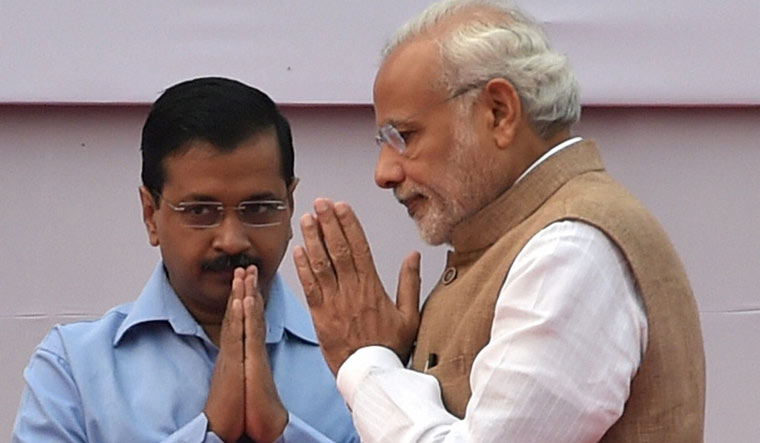The stage is set for the Assembly election in Delhi, which promises to be a 'Narendra Modi vs Arvind Kejriwal' contest and a tussle between issues of national interest and those of local relevance, with the Election Commission announcing on Monday the schedule for the state polls.
Over 1.46 crore voters of Delhi will cast their ballot on February 8. The results will be announced on February 11. The five-year term of the current Assembly ends on February 22.
The Assembly election is widely believed to be a direct contest between the ruling Aam Aadmi Party and the BJP, with the Congress—which ruled the national capital for 15 straight years under the leadership of Sheila Dikshit before its defeat in 2013—struggling to get a toehold in the political centre-stage of Delhi.
The AAP has chosen to focus on the brand value of Chief Minister Kejriwal and the work done by his government to improve governance at the local level in the last five years. There has been a conscious effort to steer clear of national issues, including the controversial moves by the Modi regime pertaining to the Citizenship (Amendment) Act and the proposed National Register of Citizens.
Instead, the AAP, which had won an astounding 67 out of 70 seats in the Assembly election in 2015, has hinged its campaign on local issues, such as improvement in the condition of schools run by the Delhi government, the opening of 450 Mohalla clinics, reduction in electricity rates, concessions made with regard to water bill arrears, development work carried out in unauthorised colonies and the doorstep delivery scheme for various facilities.
However, the BJP is apparently expecting the controversies related to CAA and NRC to have an impact on the Assembly election, which comes in the backdrop of the street protests against it in the national capital, some of them turning violent. Also, Delhi has witnessed the spectre of alleged police action against students of Jamia Millia Islamia agitating against CAA and NRC as also the assault on students of Jawaharlal Nehru University by masked assailants.
The BJP, AAP's main rival in Delhi, is making an attempt at giving the election a national colour by launching an aggressive campaign on the CAA and NRC. The outreach based on CAA-NRC was initiated by Union Home Minister Amit Shah through a door-to-door campaign in the national capital on January 5, a day ahead of the announcement of the poll schedule. He accused rivals AAP and Congress of instigating violent protests in Delhi.
The BJP will go into the election with Modi as its face, reflective of its inability to find a local leader to match Kejriwal as also its effort to turn the focus of the polls to national issues. The AAP has often dared the BJP to declare its chief ministerial candidate.
also read
- AAP's Sanjay Singh writes to PM, LG; alleges Kejriwal kept under CCTV surveillance in jail
- In SC affidavit, ED cites Kejriwal's conduct to justify his arrest
- Excise policy case: Delhi Court extends remand of Kejriwal, BRS leader Kavitha till May 7
- Kejriwal given insulin on advice of AIIMS doctors, say Tihar officials
- Tihar Jail top official counters CM Kejriwal's insulin claims: 'He is like every other inmate'
The Congress, following the drubbing it received in the 2013 state polls and after failing to win a single seat in the election in 2015, has been unable to make a mark electorally in the last five years.
The Congress found a glimmer of hope in the Lok Sabha election, where it managed to emerge as the number two party in five out of seven seats, pushing the AAP to the third spot in these constituencies.
However, after the demise of Diskhit, who was brought back from semi-retirement to lead the state unit, the party has struggled to get its act together. It was several months after Dikshit's death that the Congress named veteran Subhash Chopra as the president of the Delhi PCC.



